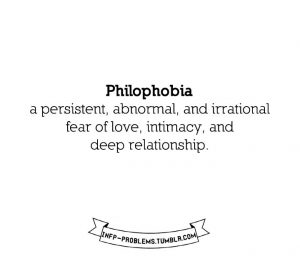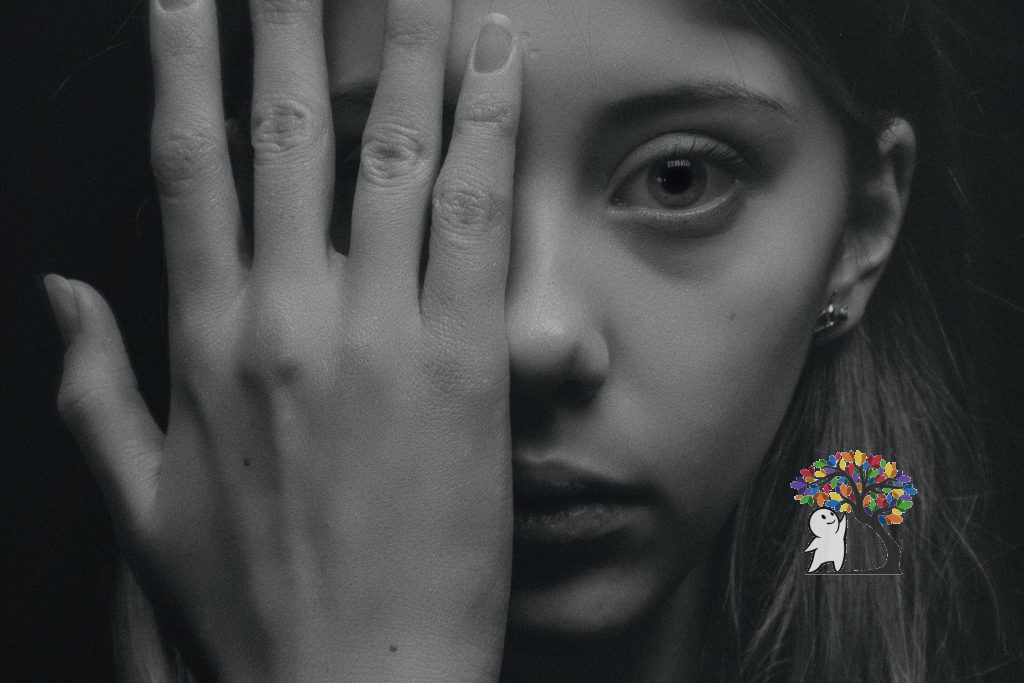PHILOPHOBIA

-I don’t think we should hang out anymore
-Why not?
-I have philophobia
Have you ever had this kind of a conversation with someone you know before? Well, it’s not the most common thing to hear really. But if you or anyone you know suffers from philophobia, perhaps you’d like to read this.
Philophobia is the fear of being or falling in love or the fear of any emotional attachment. This fear is irrational, but still gives people a hard time to control. The worst thing about it is that it keeps us apart from our loved ones. It pushes us into a life of solitude.
The fear derives from the feeling of being betrayed in love and not feeling emotionally secure in life. It has a serious effect on the quality of our lives, since the phobia interferes with it.
What triggers philophobia?
Philophobia has certain factors that trigger it. The risk is usually higher when a person has confronted any emotional confusion related to love in the past. It can also be a chronic phobia. Some of the causes are solely related to the person who has the illness, but some are connected to social life. Here are the most significant risk factors of philophobia:
Previous Traumatic Experience
If you have had a bitter experience in the past, it is quite common that you will afterwards develop philophobia. You will try to avoid any kind of commitment, romantic, or not, in order not to be hurt all over again.
Fear of Rejection or of Divorce
When it comes to the factor of rejection, you may feel like engaging in a relationship will only bring embarrassment into your life. The embarrassment deters from getting involved with anyone, really. So, you’re keeping yourself away from any relationship. The fear of divorce, however, means that you may hate to fall in love and eventually get married. Even though a relationship does not always lead to marriage, the threat of a divorce is even worse.

Cultural Norms
This cause refers to a pre-arranged marriage and the feelings that arise from this situation: being forced to spend your life with someone you barely know, not to mention you’re not in love with. Things get hard when you can not define your own life. This type of philophobia is most common amongst women. It might be true that Queen Elisabeth suffers from this kind of phobia. It may also evolve out of religious beliefs that prohibit love.
Symptoms
Symptoms are both emotional and physical. They can vary from person to person. Even though people with philophobia keep themselves in solitude, they may experience some of the following symptoms. These might be intense fear or panic, avoidance of social encounters, sweating, rapid heartbeat, nausea or difficulty breathing or functioning in general.
Diagnosis
It is rare that your doctor will diagnose you with philophobia. But it is quite possible that if you already suffer from a social anxiety disorder, you may also have that. You should not confuse philophobia with an anxiety disorder, though. There are medications to help you with it. If you think you’re suffering from the fear of falling in love, talk to your therapist about it.
Self-help
Good news for you, however! There are a few lifestyle changes you could perform to help you deal with your problem. Make exercising a part of your daily schedule. Find a couple of hours within the day to relax. Simply spend time with yourself. If you’re too busy you might as well try some mindfulness techniques.

The fear of falling or being in love, also known as philophobia, is an abnormal, persistent and unwarranted fear, but it is real. Consequently, many people experience needless stress due to this phobia. Having anything affect your life to the extent fearing love does, is not nice at all. If you know anyone who may suffer from it, try to get them some help. If you are suffering, talk to someone about it. It may completely change your life and the way you see things.
Did you like this article? Let us know in the comment section below!
Other articles you may find interesting:
10 Ways to Deal with Unrequited Love
10 Signs to Tell if You’re Falling in Love
I Love You with My Hypothalamus




This is a great topic! Philophobia is not as widely discussed as many other common phobias but it’s certainly just as fascinating.
You mention it briefly in the section on cultural norms but gender can play a significant role in how philophobia manifests. I think this section can also be expanded to include the relationships philophobic people have with their parents. Expanding upon the information provided in this section would enhance the readers understanding of what philophobia is and where it can come from. (http://www.hdbp.org/psychiatria_danubina/pdf/dnb_vol26_sup1/dnb_vol26_sup1_178.pdf)
Additionally, the section on fear of rejection or divorce needs a little bit of clarity. I like that you connected the two because they go hand-in-hand. The fear of divorce (relationship failure at the “deepest” level of connection) and fear of rejection (relationship failure often at the beginning or middle) both deter people from pursuing and engaging in relationships. It might make the paragraph more captivating if you weave the two together a little more.
Finally, there were a couple of little grammatical errors. In the first sentence of the section on cultural norms, it says “feelings that arouse from the situation”. It might be clearer if you say ” feelings that “arise”, “arose”, or “are aroused” “. Also, in the last sentence of the article it looks like you may have added a backslash instead of a period.
Again, this was such an interesting topic! What made you want to write about this particular phobia?
Hello Valencia!
Thank you so much for reading my article and taking time to leave this really helpful comment!
I’m going to first reply to your mentioning grammatical errors. I’m not a native speaker, so sometimes there are mistakes I sadly cant avoid. Thanks for pointing the “arouse” thing out though, I corrected it!
Moving on to your additions to his topic, I will make sure to either write and updated version including what you’ve mentioned in your comment, or if that turns out to be too long, I’ll do something like a part two. Your idea about the relationship of philophobic people and parents sounds really interesting! Also, thank you for including a link in your response!
What made me want to write about philophobia, is that we often forget it exists. Many people judge others so harshly when they don’t want a relationship, for whatever reasons, and it gets worse at some cases, when one receives criticism even from ones close family members, if they’re not married/ in a relationship by a certain age. Reasons for not wanting a relationship vary, and I’m not implying philophobia is always the reason. However, many people may actually suffer and have no idea about it. My main cause is to rise awareness and encourage people to learn more about themselves and, if needed, ask for help.
Thank you once again for the really helpful comment!
[…] psych2go […]
[…] Источник: psych2go.net […]
[…] you begin reading this article, please consider giving this a quick read […]